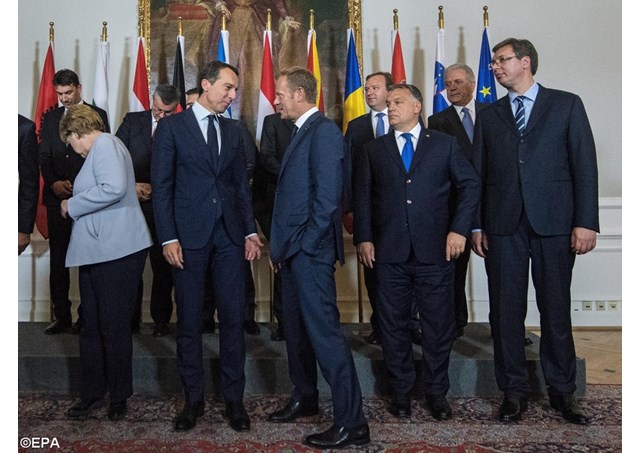
EU leaders discuss closing Balkans route amid migrant crisis

(Vatican Radio) Austria's chancellor has convened a meeting of his German, Greek and west Balkans counterparts on strategies to deal with Europe's biggest migration crisis since World War Two, including closing the so-called Balkans route, which was used by hundreds of thousands of refugees.
Listen to Stefan Bos' report:
European leaders met in Vienna Saturday at Austrian Chancellor Christian Kern's invitation to discuss how to better fortify the European Union's outer borders against illegal migration and trafficking.
As the meeting began, EU Council President Donald Tusk told reporters that the summit should focus on how to keep closed the Balkans route that was used last year by hundreds of thousands of people from Syria, Iraq, Afghanistan and other troubled nations. "Since the first days of the migration crisis I had no doubts that the main key to a resolution is restoring effective control of the EU external borders," he said.
"And obviously an essential precondition towards achieving this goal is close cooperation with our partners in the Balkans and Turkey. Today we should discuss how to improve the effectiveness of our actions. We need to confirm politically and in practise that Balkans route is closed for good," the commissioner added.
He and Austrian, German, Greek and west Balkan leaders tried to overcome their differences amid mounting tensions within the EU over whether to accept more asylum seekers and how to resettle them within the EU.
Open door
Germany's Open Door policy has been especially criticized by Eastern European countries. Hungary's anti-migration Prime Minister Viktor Orbán, for instance, even proposed that in his words "illegal migrants should be rounded up and placed in refugee camps set up outside the EU."
Orbán spoke ahead of a Hungary's October 2 referendum on whether to accept EU plans to resettle some 160.000 refugees among member states.
Yet the EU's migration commissioner, Dimitris Avramopoulos, called for a more compassionate, humane approach towards refugees. "And I am sure that today following the debates that will follow we shall all come out showing solidarity among us. And of course providing always human despertate people with humanity and signity," he said.
However, "let me tell me one thing: Since we talk about solidarity, solidarity is not à la card," Avramopoulos added.
"Solidarity and responsibility are basic values and principles. Not only moral principles but also legal principles, explicitly stipulated in the treaties of the Union."
At the same time the EU wants to prevent a repeat of the situation last year when more than a million migrants and refugees crossed into Europe.
| All the contents on this site are copyrighted ©. |


